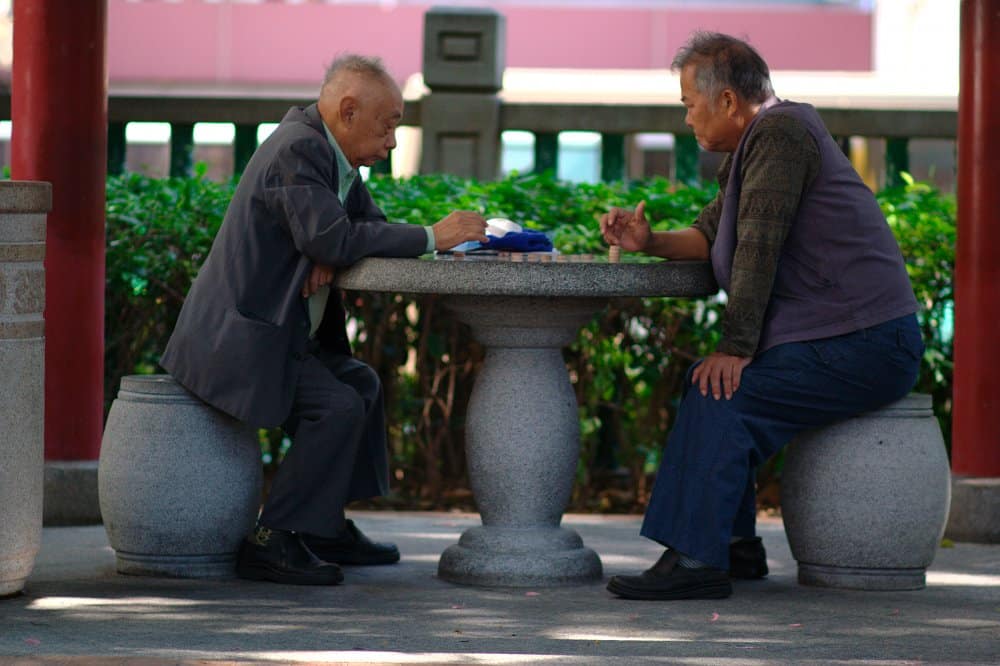My freshman year, I was new to Boston. I had moved from New York—not far in distance, but a leap to a new life stage. One day in October, as the leaves were preparing themselves to change color, I met someone else new to Boston.
He had plain, unadorned glasses, maroon shoes, brown pants, a brown coat, and a collared shirt. His skin was the color of dried ginger, mottled yellow-brown in places. His sparse white hair was covered with a corduroy cap. He hunched slightly, perhaps in age, or perhaps in deference. I looked at his face. It was smiling, laugh lines built in where you’d never think laugh lines would be—in the forehead, in the neck, on the tip of the nose. His eyes never shone, but they also never dimmed. They twinkled.
When I think about Dong Fugen now, I realize I never saw him not smiling. I never saw him frown at a strange English grammar rule, roll his eyes at an irregular verb ending, put down his pencil and huff in frustration after coming to class through a snowstorm. Dong Fugen was my student in the first class I ever taught, a Saturday class called “Chinatown ESL.” Students from the Boston Chinatown area (and often beyond) converged on our campus every weekend for two hours. At the time, as a freshman in my first Mandarin class, I was just learning the four tones. All I could say was “Mother scolded the horse (媽媽罵馬)”—and probably poorly. But I enjoyed the thought that in some way, I could use my students’ language to connect with them—and that this might inspire them to keep learning English.
I remember Dong Fugen’s name partly because of how he introduced himself on the first day. “I am Dong Fugen. Dong Fugen my name!” He chuckled slightly at his cute pun on “Don’t forget.” He was my most eager student. He used the thesaurus to riddle his optional homework essays with words that flung the sentence to the far ends of the imagination and back. His reason for continuing to study English? He wanted to be able to talk to the American grandparents when he took his American grandchildren to the park in Boston.
My secret, which I never told Dong Fugen, was that he reminded me of my own grandpa. He gave off a lofty and distinguished air, but he was in fact very humble. Love emanated from every spot on his bald pate, though he was pondering, not obvious, with his affection. I remembered the way his smile broadened when he described his grandchildren, and I imagined how happy it made him when they wrapped their short arms around him at the park. I imagined in ten years, when they could drive cars or ride the T alone, and had their own friends and some semblance of their own lives, how they might shun him. How, as teenagers, they might not even know how much shunning him could quietly hurt him. It alternately made me very touched and very panicked. I resolved from that point onwards to always hug my own grandfather, and always show how much I loved him.
Dong Fugen was my loyal student for four years. But then, I graduated. When you graduate, you are forced to move into another sphere of your life so flippantly, so quickly. I figured I would lose Dong Fugen. It happens—you have relationships with people on some border of your life—not the core—and when you move, the core might stay, but the borders change. It made me sad to think I might not see Dong Fugen again, but I thought of him often, and hoped he was well—and hoped it was enough. I didn’t think the person I would lose so quickly, in such a real and tangible way, was actually my own grandfather. As he passed away in a hospital in America, continents away from his hometown in India, I was running a half-marathon in Taipei, continents away from my own home.
We all have that in common, though—me, my grandfather, and Dong Fugen—moving and adapting to new places with a smile on our faces. That’s why I know my grandfather was okay, in the end—and why Dong Fugen will be okay—even if I’m not there to confirm that fact. I think we’ll all be okay if, like Dong Fugen, we let our laugh lines run deep.
我能记得Dong Fegen的原因一部分是因为他第一天介绍自己的方法.“我是Dong Fugen. Dong Fugen我的名字!” (translator’s note: Dong Fugen英文发音与“莫忘记”的英文音类似)他对他自己的双关语笑了一笑. 他是我最积极的学生. 他会用同义字字典写他尓外的功课, 用的字更是十分有想象力。他继续学英文的原因是什么?当他带着他的孙子到波士顿的公园时, 他想要跟美国的其他外公外婆们讲话.
我从来没有告诉他的秘密就是他让我想起我的外公. 他散发一种高尚和与众不同的气息, 但他其实很谦虚. 他光秃秃的头顶散发着爱心, 他是用他的关爱在思考着. 我记得他提到他的孙子时会咧着笑脸, 而我想像当他的孙子在公园用短短的手抱他的时候, 是让他多么的快乐. 我想像十年之后, 当他的孙子会开车或自己搭地铁, 并有自己朋友和类似自己生活时, 他们可能会排挤他. 当他们成为青少年时, 他们可能甚至不知道这样做可能默默地伤害他. 这让我很感动也很焦虑. 我决定从那时之后每次都要抱我的外公和告诉他我有多爱他.


